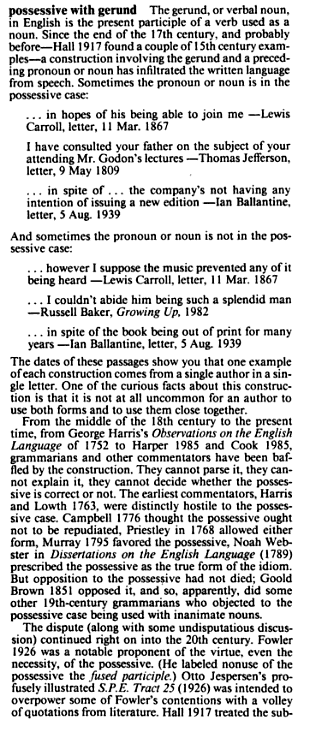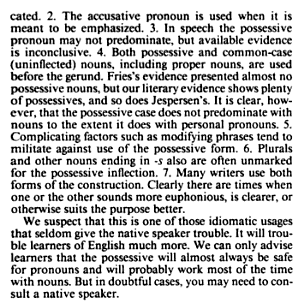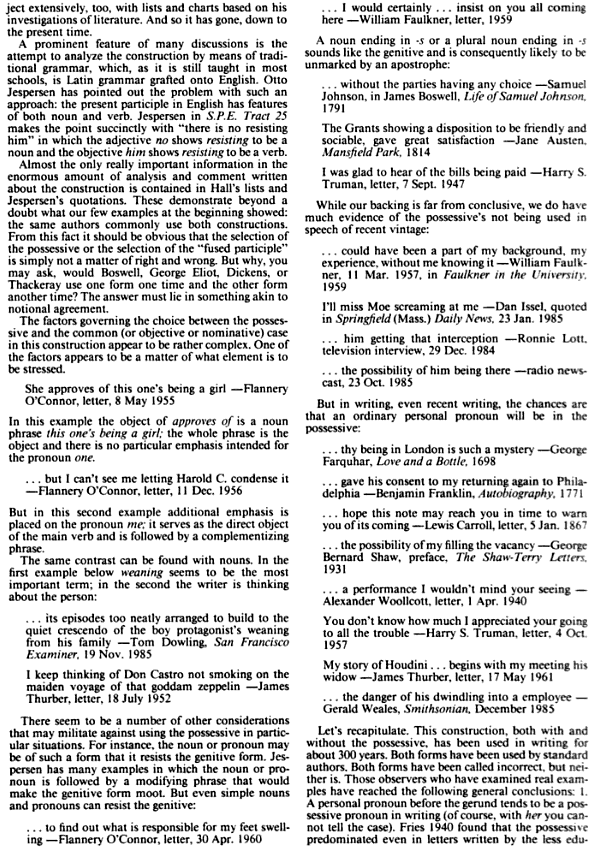Usage advice
« previous post | next post »
Yesterday I got this note from a reader:
I seem to remember a Language Log post about the construction "I appreciate you coming over to help me" as opposed to the prescriptively approved "I appreciate your coming over to help me." I am in a discussion with a prescriptivist about the validity of the former but I can't find the relevant post on LL. Can you help?
There have been a couple of relevant posts over the years, but what this reader really needed was a reminder to check his copy of the Merriam-Webster's Dictionary of English Usage (or the concise edition of the same work).
Here's the MWDEU entry on possessive with gerund:

(Click on the page image below for a larger version…)

If you don't already own it, you should go buy this book. And just as important, when a question of English usage comes up, it's one of the first places that you should look for an evidence-based opinion.
For a deeper discussion of the grammar of these contructions, see CGEL 14 § 1.5 (pp. 1187-1193), "The structure of gerund-participials", which implicitly amends MWDEU's generalization that "From the middle of the 18th century to the present time, grammarians […] cannot parse it, they cannot explain it, they cannot decide whether the possessive is correct or not". CGEL will also give you another argument against the quaint view that the possessive should always be obligatory, namely the treatment of fused-head demonstratives like this and that:
I object to this being called a loophole.
*I object to this's being called a loophole.
Some customers skipped out on their drink orders, despite that being all they had to pay for.
*?Some customers skipped out on their drink orders, despite that's being all they had to pay for.
For a more quantitative picture of current informal usage — and some mysteries about differences among pronouns in particular contexts — you could collect some (alas mostly bogus) web counts. Compare
| (ratio) | ||||
| appreciate me helping | 211 | appreciate my helping | 102 | 2.1 to 1 |
| appreciate you helping | 6,330 | appreciate your helping | 16,500 | 1 to 2.6 |
| appreciate him helping | 544 | appreciate his helping | 250 | 2.2 to 1 |
| appreciate us helping | 118 | appreciate our helping | 14,900 | 1 to 126 |
| appreciate them helping | 698 | appreciate their helping | 425 | 1.6 to 1 |
with
| (ratio) | ||||
| prevent me leaving | 878 | prevent my leaving | 3,880 | 1 to 4.4 |
| prevent you leaving | 4,450 | prevent your leaving | 1,160 | 3.8 to 1 |
| prevent him leaving | 3,130 | prevent his leaving | 12,900 | 1 to 4.12 |
| prevent us leaving | 627 | prevent our leaving | 2,530 | 1 to 4.0 |
| prevent them leaving | 630 | prevent their leaving | 4,300 | 1 to 6.8 |
But for a practical overview of opinion and evidence, it's hard to beat MW(C)DEU. It's the prescriptivist's description (James Kilpatrick blurbed it as "A writer's best friend" on the cover of the Concise edition) and the descriptivist's prescription (that hard set at Language Log have often recommended it).

Jorge said,
March 3, 2009 @ 8:38 am
Going to the last page of "appreciate our helping", the 14,900 hits become 36, some of which are "appreciate our helping hand(s)".
[(myl) Ah, the perils of trying to do corpus linguistics by web search…
The bogosity of the Google counts is underlined by some comparisons. In the BNC, there appear to be 5 instances of "you helping" where you is the subject of the gerund-participle, vs. 1 comparable instance of "your helping"; the LDC's conversational speech corpora have 1 "you helping" vs. 0 "your helping"; the LDC's gigaword news corpus has 7 instances of "you helping" to 0 of "your helping" (once we remove the instances of "your helping hand", "get your helping of celebrity", etc.). This gives us an overall count of 13 "you helping" vs. 1 of "your helping", in stark contrast to the 1 to 2.6 odds the other way for the Google counts.
Looking at "us helping" vs. "our helping", we find that the BNC is 1 to 0, the LDC conversations are 2 to 0, the LDC gigaword is 6 to 2, for a total of 9 to 2, in even starker contrast to the Google-count odds of 1 to 126.
It would really be nice to be able to get vaguely reliable counts from a web search, with the ability to look at (random samples of) all the hits as well. These capabilities are easy to arrange if you actually have the corpus, but none of the web search engines give them to you.
Web counts are not always as bad as they happen to be in this case, but they're not very reliable. ]
Matthew said,
March 3, 2009 @ 8:50 am
Does the DEU have more entries, or is it just that the CDEU has cut down versions of the same entries? (The price difference on Amazon UK is only £1.54, so I'm happy to get the weightier tome.)
Neil said,
March 3, 2009 @ 10:15 am
Wouldn't the sage advice for non-native English speakers go at the beginning of the long, wonky article describing the history of the difficulty of pinning the particular construction down?
I'm a fan of the MWDEU; I ordered one immediately when it was first pimped on LL, but it seems that if the advice is "The possessive is more or less always okay, except when it's not," then that should be the lede.
In any case: thanks for this post. I was actually wondering how I could find some good commentary on this issue, myself.
Aaron Davies said,
March 3, 2009 @ 10:40 am
someone's working on an open full index of the web: Dotbot. (i have better things to do at the moment than download 70GB files, so i haven't had a look at the their data yet, but perhaps it would be useful to you.)
[(myl) It would be nice to have a (sample of a) clean snapshot to work with. Without quite a bit of filtering, the web as a whole is pretty unclean — the good thing about searches on Google and its rivals is that they do a good job of clearing out the link farms and splogs and so on. It's not clear to me whether the folks at dotnetdotcom even try (though we can hope). ]
Ryan said,
March 3, 2009 @ 11:36 am
Kind of off-topic, but did the "neither is" in the last paragraph of the second page strike anyone else as awkward?
Dave said,
March 3, 2009 @ 12:44 pm
I don't necessarily want to discourage people going out and buying books, but MWDEU is available in full from Google Books:
http://books.google.com/books?id=2yJusP0vrdgC&printsec=frontcover&ei=rGutSZ3CHYHmkgSPoZSXBQ
Timothy Martin said,
March 3, 2009 @ 1:05 pm
Graphical problem: Clicking the page image actually makes the image smaller for me. I'm guessing it's because the function of that code or whatever is to make a graphic fit better on one's screen, so if it's small it makes it larger, and if it's large it makes it smaller. I hope links to larger images can be given in the future, since that was a little hard to read.
Neil said,
March 3, 2009 @ 1:18 pm
@Timothy, did you try hovering your mouse over the picture in the new window? Many browsers resize photos to fit the window, and you have to click on the photo to expand it.
Jon May said,
March 3, 2009 @ 1:36 pm
Do the LL cognoscenti have a particular preference for MWDEU over Garner? I first got into Garner thanks to David Foster Wallace's fun essay on it (and on prescriptivism vs. descriptivism) and rather enjoy his prose, but maybe there are bones to pick that MWDEU (or something else) answers?
Ellen said,
March 3, 2009 @ 2:57 pm
Timothy, right click and hit "Open Link in New Window" (or tab).
Stephen Jones said,
March 3, 2009 @ 4:16 pm
The MWDEU makes its judgements on the basis of the evidence. Garner finds his evidence (when he has any) on the basis of his judgement.
Bryn LaFollette said,
March 3, 2009 @ 5:49 pm
@Ryan
"Both forms have been called incorrect, but neither is."
This sounds like a pretty natural ellipsis to me. It would sound more odd, I think, if "incorrect" hadn't been elided after the disjunction.
Tom Recht said,
March 3, 2009 @ 6:25 pm
There does seem to be some difference in meaning between the two constructions, in some cases. "I'll miss Moe screaming at me" isn't quite the same as "I'll miss Moe's screaming at me" – you could possibly rectify the latter situation by making a tape recording of Moe's screaming to play back in nostalgic moments, but not so for the former.
(Btw, surely the "boy protagonist's weaning from his family" example doesn't belong here? The boy protagonist isn't the subject of weaning in that construction.)
Troy S. said,
March 3, 2009 @ 7:01 pm
I agree there is a subtle difference in what the speaker emphasizes in each construction. It seems that the gerund behaves more like a noun in the possessive construction, and more like verb in the other. That they have to be modified differently (with an adjective vice an adverb) illustrates this:
1. Your constant coming and going through my office is going to drive me crazy.
2. You constantly coming and going through my office is going to drive me crazy.
It's also clear that in the latter case "You" is not the subject by itself since "You constantly coming and going … are going to drive me crazy"sounds totally wrong, as do "You constant …" and "Your constantly …"although the last one seems slightly less wrong to my ear.
Timothy Martin said,
March 3, 2009 @ 8:00 pm
@Ellen: Ah, that works just fine. Thank you :)